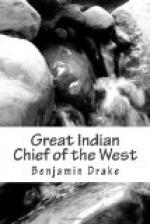Many causes operate in bringing about an Indian war, and in plunging the government of the United States, prematurely and unnecessarily, into it. There is generally upon the frontiers a class of persons who have nothing to lose, and much to gain by such a contest. It gives them employment and circulates money among them. With such pioneer loafers, an Indian war is always popular. Then there is the “Indian Hater,"[11] a numerous and respectable body of men, to be found upon the frontier settlements, who, from having suffered in their persons and property by the barbarities and plunder of the Indians, have come at length to look upon them as no better than the wild beasts of the forest, and whose many atrocities make it a moral duty, on the part of the whites, to exterminate by fire and the sword. Again there is the regular squatter and land speculator, whose interest is always promoted by a war, because it usually results in driving the Indians further back from the frontier. Intermixed with these classes, are many quiet and worthy citizens, who with their families, have been carried to the frontiers, in the ordinary course of events, by the tide of emigration. These may have neither a desire for war nor a feeling of hostility towards the Indians, but when the tomahawk is raised, they contribute to swell the alarum, and oftentimes, by their very fears of a war, do much to bring it about. Finally, it is not to be disguised, that there are many individuals, in the states, who are prone to look to an Indian war, as a means of gratifying their love for adventure and excitement; or who, having political aspirations, are disposed to make the military renown, which may be gained in a campaign, the means of attaining civic honors. It is obvious, if there be any foundation for these positions, that an Indian war may oftentimes be undertaken without any just cause, prosecuted without system and terminated in dishonor to our government.
When Black Hawk and his party rashly determined, in the spring of 1832, to recross the Mississippi, a fine opportunity was presented, for getting up a border war, and the necessary machinery was speedily put in motion. The old chief, with a few hundred braves and their women and children, carrying with them their cooking utensils and personal property, had no sooner reached the east bank of the Mississippi, than the alarm note was sounded upon the frontier, and echoed from cabin to cabin, until it was spread throughout the state of Illinois. The most dreadful anticipations of savage cruelty were indulged—the force of Black Hawk was greatly magnified—his thirst for vengeance upon the whites was only to be appeased by blood—the state was actually invaded by a powerful and remorseless enemy—and memorials and petitions, for an armed force to repulse the invaders and protect the frontiers, flowed in upon the Governor, from all quarters. Such was the excited state of public feeling, such the force




